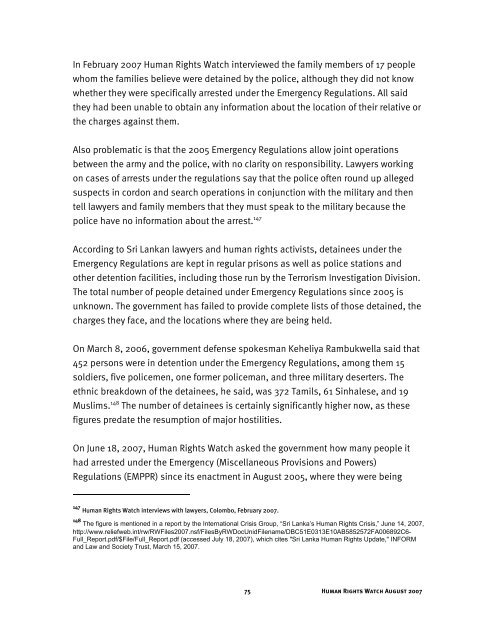Return to War - Human Rights Watch
Return to War - Human Rights Watch
Return to War - Human Rights Watch
You also want an ePaper? Increase the reach of your titles
YUMPU automatically turns print PDFs into web optimized ePapers that Google loves.
In February 2007 <strong>Human</strong> <strong>Rights</strong> <strong>Watch</strong> interviewed the family members of 17 people<br />
whom the families believe were detained by the police, although they did not know<br />
whether they were specifically arrested under the Emergency Regulations. All said<br />
they had been unable <strong>to</strong> obtain any information about the location of their relative or<br />
the charges against them.<br />
Also problematic is that the 2005 Emergency Regulations allow joint operations<br />
between the army and the police, with no clarity on responsibility. Lawyers working<br />
on cases of arrests under the regulations say that the police often round up alleged<br />
suspects in cordon and search operations in conjunction with the military and then<br />
tell lawyers and family members that they must speak <strong>to</strong> the military because the<br />
police have no information about the arrest. 147<br />
According <strong>to</strong> Sri Lankan lawyers and human rights activists, detainees under the<br />
Emergency Regulations are kept in regular prisons as well as police stations and<br />
other detention facilities, including those run by the Terrorism Investigation Division.<br />
The <strong>to</strong>tal number of people detained under Emergency Regulations since 2005 is<br />
unknown. The government has failed <strong>to</strong> provide complete lists of those detained, the<br />
charges they face, and the locations where they are being held.<br />
On March 8, 2006, government defense spokesman Keheliya Rambukwella said that<br />
452 persons were in detention under the Emergency Regulations, among them 15<br />
soldiers, five policemen, one former policeman, and three military deserters. The<br />
ethnic breakdown of the detainees, he said, was 372 Tamils, 61 Sinhalese, and 19<br />
Muslims. 148 The number of detainees is certainly significantly higher now, as these<br />
figures predate the resumption of major hostilities.<br />
On June 18, 2007, <strong>Human</strong> <strong>Rights</strong> <strong>Watch</strong> asked the government how many people it<br />
had arrested under the Emergency (Miscellaneous Provisions and Powers)<br />
Regulations (EMPPR) since its enactment in August 2005, where they were being<br />
147 <strong>Human</strong> <strong>Rights</strong> <strong>Watch</strong> interviews with lawyers, Colombo, February 2007.<br />
148 The figure is mentioned in a report by the International Crisis Group, “Sri Lanka’s <strong>Human</strong> <strong>Rights</strong> Crisis,” June 14, 2007,<br />
http://www.reliefweb.int/rw/RWFiles2007.nsf/FilesByRWDocUnidFilename/DBC51E0313E10AB5852572FA006892C6-<br />
Full_Report.pdf/$File/Full_Report.pdf (accessed July 18, 2007), which cites "Sri Lanka <strong>Human</strong> <strong>Rights</strong> Update," INFORM<br />
and Law and Society Trust, March 15, 2007.<br />
75<br />
<strong>Human</strong> <strong>Rights</strong> <strong>Watch</strong> August 2007

















